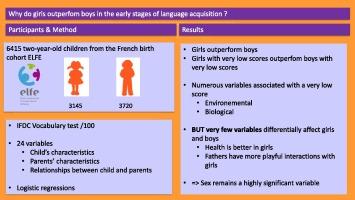Factors influencing language performance in boys and girls at age 2 in the French ELFE birth cohort
IF 2.7
4区 医学
Q3 NEUROSCIENCES
引用次数: 0
Abstract
Different environmental and biological variables affect the rhythm of language acquisition in children. A substantial amount of literature has shown that girls overtake boys, at least in the early stages of language acquisition. The goal of this study is to investigate how different factors affect language scores in girls and boys. The parents of 6415 two-year-old French children from the ELFE cohort completed a parental questionnaire assessing language development. Our results show that girls do indeed display higher scores. In order to explore the impact of different variables – such as child characteristics, parental characteristics, the extent to which parents have interactions, such as reading and singing with children – on girls’ and boys’ scores, we tested logistic regressions contrasting children with very low scores with those with average or high scores. We found that sex remained a highly significant explanatory variable. Finally, we analyzed the extent to which there are differences between girls and boys in terms of the variables associated with a low score. Strictly exposed to the same unfavorable factors, girls with very low scores at two years master more words than boys with very low scores. Although different variables are significantly associated with a low score, sex remains a highly significant explanatory variable. Hence, our work contributes significantly to the debated issue of sex/gender influence on language acquisition.

影响法国 ELFE 出生队列中男孩和女孩 2 岁时语言表现的因素。
不同的环境和生物变量会影响儿童学习语言的节奏。大量文献表明,至少在语言习得的早期阶段,女孩的语言能力超过男孩。本研究旨在探讨不同因素如何影响女孩和男孩的语言成绩。6415名来自ELFE队列的两岁法国儿童的家长填写了一份评估语言发展的家长问卷。我们的结果显示,女孩的得分确实更高。为了探究不同变量(如儿童特征、父母特征、父母与儿童互动的程度,如与儿童一起阅读和唱歌)对女孩和男孩得分的影响,我们对得分很低的儿童与得分一般或较高的儿童进行了逻辑回归对比测试。我们发现,性别仍然是一个非常重要的解释变量。最后,我们分析了女孩和男孩在与低分相关的变量方面的差异程度。严格来说,在面临相同不利因素的情况下,两年时得分很低的女生掌握的单词比得分很低的男生多。尽管不同的变量与低分有明显的关联,但性别仍然是一个非常重要的解释变量。因此,我们的研究对性别影响语言习得这一争论不休的问题做出了重要贡献。
本文章由计算机程序翻译,如有差异,请以英文原文为准。
求助全文
约1分钟内获得全文
求助全文
来源期刊

Brain Research
医学-神经科学
CiteScore
5.90
自引率
3.40%
发文量
268
审稿时长
47 days
期刊介绍:
An international multidisciplinary journal devoted to fundamental research in the brain sciences.
Brain Research publishes papers reporting interdisciplinary investigations of nervous system structure and function that are of general interest to the international community of neuroscientists. As is evident from the journals name, its scope is broad, ranging from cellular and molecular studies through systems neuroscience, cognition and disease. Invited reviews are also published; suggestions for and inquiries about potential reviews are welcomed.
With the appearance of the final issue of the 2011 subscription, Vol. 67/1-2 (24 June 2011), Brain Research Reviews has ceased publication as a distinct journal separate from Brain Research. Review articles accepted for Brain Research are now published in that journal.
 求助内容:
求助内容: 应助结果提醒方式:
应助结果提醒方式:


